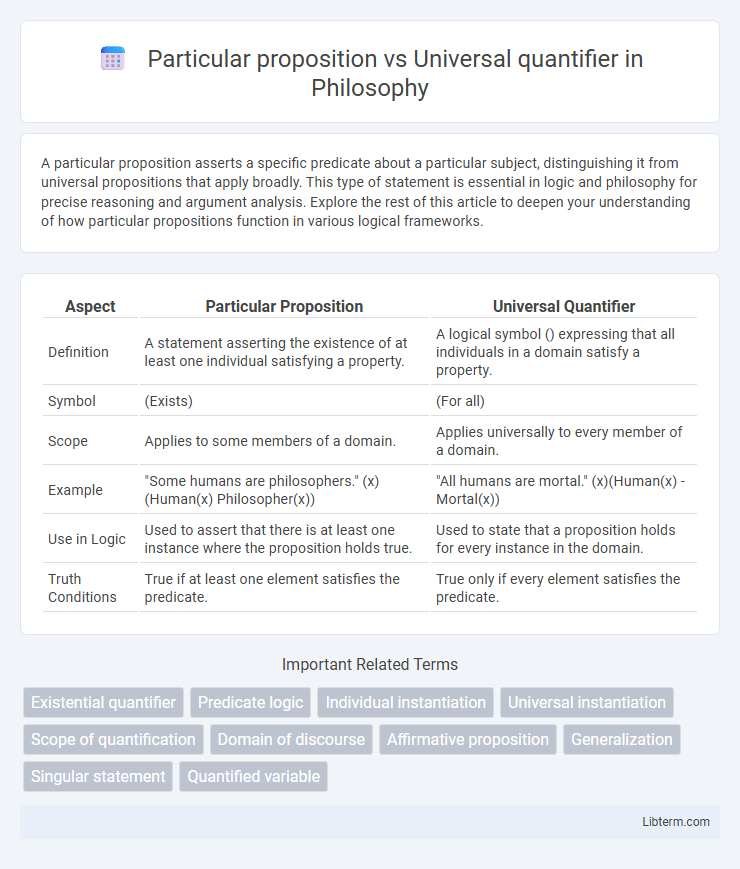A particular proposition asserts a specific predicate about a particular subject, distinguishing it from universal propositions that apply broadly. This type of statement is essential in logic and philosophy for precise reasoning and argument analysis. Explore the rest of this article to deepen your understanding of how particular propositions function in various logical frameworks.
Table of Comparison
| Aspect | Particular Proposition | Universal Quantifier |
|---|---|---|
| Definition | A statement asserting the existence of at least one individual satisfying a property. | A logical symbol () expressing that all individuals in a domain satisfy a property. |
| Symbol | (Exists) | (For all) |
| Scope | Applies to some members of a domain. | Applies universally to every member of a domain. |
| Example | "Some humans are philosophers." (x)(Human(x) Philosopher(x)) | "All humans are mortal." (x)(Human(x) - Mortal(x)) |
| Use in Logic | Used to assert that there is at least one instance where the proposition holds true. | Used to state that a proposition holds for every instance in the domain. |
| Truth Conditions | True if at least one element satisfies the predicate. | True only if every element satisfies the predicate. |
Introduction to Propositions and Quantifiers
Particular propositions assert that there exists at least one element in a domain satisfying a given property, typically expressed using the existential quantifier (). Universal quantifiers () declare that a property holds for every element in the domain, establishing comprehensive truth across all members. Understanding the distinction between particular propositions and universal quantifiers is fundamental in formal logic, enabling precise expression of statements involving existence and universality.
Defining Particular Proposition
A particular proposition asserts that a predicate applies to some members of a specific subject class, indicating at least one instance without covering the entire class. This proposition is symbolized using the existential quantifier (), emphasizing the existence of at least one element satisfying the given property. In contrast to the universal quantifier (), which applies the predicate to all members, the particular proposition limits the claim to some subset within the subject domain.
Understanding the Universal Quantifier
The universal quantifier, symbolized as , asserts that a given proposition applies to all elements within a specified domain, such as "x P(x)" meaning "for all x, P(x) is true." Unlike particular propositions that claim existence for some elements (x P(x)), the universal quantifier requires the proposition to hold universally without exceptions. Mastery of universal quantifiers is fundamental in formal logic and predicate calculus, enabling precise statements about entire sets or classes.
Key Differences Between Particular and Universal Statements
Particular propositions assert that some members of a subject class satisfy a predicate, typically expressed with existential quantifiers like "some" or "there exists," indicating partial inclusion. Universal quantifiers, symbolized by "for all," apply predicates to every member of a subject class, asserting complete inclusion without exception. The key difference lies in their scope and truth conditions: particular propositions require only one example for truth, while universal statements demand every instance to conform.
Symbolic Representation of Particular Propositions
Particular propositions are symbolized using the existential quantifier (), indicating the existence of at least one element satisfying a property, typically expressed as x P(x). In contrast, universal quantifiers () represent statements true for all elements within a domain, expressed as x P(x). The symbolic representation of particular propositions allows precise formulation of statements such as "Some S are P," highlighting partial existence rather than totality involved in universal quantification.
Formal Structure of Universal Quantifiers
Universal quantifiers in formal logic are expressed using symbols like to denote statements applying to all elements in a domain, structurally represented as x P(x), meaning "for every x, property P holds." Particular propositions contrast by asserting existence rather than universality, typically represented with existential quantifiers (x P(x)), indicating "there exists at least one x such that P(x) is true." The formal structure of universal quantifiers requires careful handling of variable scope and domain specification to ensure precise logical interpretation and avoid ambiguity in predicate logic.
Logical Implications in Mathematical Proofs
Particular propositions assert the existence of at least one element satisfying a property, while universal quantifiers claim that all elements meet the property. In mathematical proofs, universal quantifiers enable generalization from specific cases, establishing that a statement holds for every instance within a domain. Understanding the logical implications between these quantifiers is crucial for constructing valid arguments, as proving a universal statement often requires demonstrating the particular case for an arbitrary element.
Common Examples in Formal Logic
Particular propositions assert that some members of a domain satisfy a property, typically expressed with the existential quantifier (x), as in "Some cats are black," while universal quantifiers (x) denote that all members of a domain meet a condition, such as "All humans are mortal." Common examples in formal logic include x(P(x)), meaning "There exists at least one x for which P(x) is true," versus x(P(x)), meaning "For every x, P(x) is true." These quantifiers are fundamental in predicate logic for specifying the scope and generality of statements about elements in a set.
Applications in Computer Science and Mathematics
Particular propositions, expressed as existential quantifiers, allow for statements asserting the existence of at least one element satisfying a property, crucial in database queries and algorithm design. Universal quantifiers enable assertions that all elements in a domain satisfy a condition, foundational in formal verification and predicate logic. These quantifiers underpin model checking, automated theorem proving, and type systems in programming languages, supporting correctness and soundness proofs.
Summary: Choosing Between Particular and Universal Quantification
Choosing between particular proposition and universal quantifier depends on the scope of the assertion. Particular propositions assert existence or truth for some members within a domain, while universal quantifiers apply the claim to every member of that domain. Understanding the distinction guides precise logical formulation and accurate interpretation in mathematical proofs or formal reasoning.
Particular proposition Infographic

 libterm.com
libterm.com